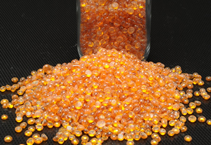German tyre maker Continental is the first tyre manufacturer to use the new Vulkanox HS Scopeblue rubber additive from German speciality chemicals firm Lanxess. This is the more sustainable, ISCC Plus-certified version of the proven additive Vulkanox HS (TMQ). The product is said to reliably protect rubber compounds during vulcanization from influences such as oxygen and heat.
Compared to the conventionally manufactured product, Vulkanox HS Scopeblue has a CO2 footprint that is more than 30% lower. Lanxess says it achieves this by using sustainable bio-circular acetone and renewable energies in production. The overall chemical structure of the additive remains unchanged. This means that tire manufacturers do not need to adapt their production processes.
The company says it developed Vulkanox HS Scopeblue to meet the growing demand for more sustainable and environmentally friendly materials. The additive carries the Scopeblue label, which stands for products with a particularly low carbon footprint or a high proportion of circular raw materials.
Production takes place in a mass balance-based, ISCC Plus-certified facility in Germany and Lanxess uses the cradle-to-gate approach to calculate its carbon footprint, which includes Scope 1 (direct emissions), Scope 2 (indirect emissions from energy) and Scope 3 (other indirect emissions).
Vulkanox HS Scopeblue is said to effectively protects rubber compounds during vulcanisation from influences such as oxygen and heat. This strengthens the thermal stability of the compound in the early stages of processing and ensures the long-term performance of the tire. In addition, Vulkanox HS Scopeblue is characterised by low volatility and low migration tendency.

